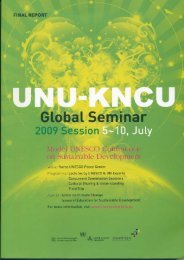íëìë³´ë2012문íì ë°ì ë¼ì´ëí ì´ë¸.pdf - ì ë¤ì¤ì½íêµììí
íëìë³´ë2012문íì ë°ì ë¼ì´ëí ì´ë¸.pdf - ì ë¤ì¤ì½íêµììí
íëìë³´ë2012문íì ë°ì ë¼ì´ëí ì´ë¸.pdf - ì ë¤ì¤ì½íêµììí
Create successful ePaper yourself
Turn your PDF publications into a flip-book with our unique Google optimized e-Paper software.
Water, sanitation and<br />
flood protection<br />
Water and sanitation<br />
Food and nutrition<br />
Public<br />
administration, law,<br />
and justice<br />
Governance<br />
Democracy and<br />
governance<br />
Governance (public<br />
administration)<br />
Disasters and<br />
emergencies<br />
Humanitarian<br />
assistance<br />
Industry and trade<br />
Economic growth and<br />
trade<br />
Global partnerships<br />
Agriculture, fishing,<br />
and forestry<br />
Agriculture, forestry<br />
and fishery<br />
Energy and mining<br />
Industry and energy<br />
Finance<br />
Information and<br />
communication<br />
Transportation<br />
(Cross-cutting<br />
programs)<br />
Cross-cutting<br />
(environment,<br />
gender, ICT, human<br />
rights)<br />
The lack of culture in the sectors can be explained in three ways: First, culture tends to be<br />
unsuccessful in driving international sensationalism and creating a macroscopic discourse<br />
meant to tackle a global crisis. In other words, culture has little chance to form a<br />
comprehensive global governance system to ensure international cooperation, unlike issues<br />
such as the physical aftermath of warfare and terrorism, natural disasters triggered by<br />
environmental problems and climate change, and the threat of financial crisis to economies<br />
worldwide. While there are cultural heritages that are in danger of demolition, the impacts of<br />
such threats are negligible on the international scale and thus fail to make people recognize<br />
the situation as a global crisis.<br />
Second, even if cultural issues can be successfully raised, it remains difficult for culture to<br />
provide sufficient incentive for people to take action. Environmental issues have generated<br />
booming industries, and new guidelines such as carbon emission rights have led to lucrative<br />
business opportunities on the flip side of the ongoing discourse on the environmental crisis.<br />
In contrast, although culture has been successfully commercialized on a large scale in<br />
developed countries, this is not true in the case of developing countries, where the role and<br />
capability of culture is still weak, as is the link between culture and the national economy.
















